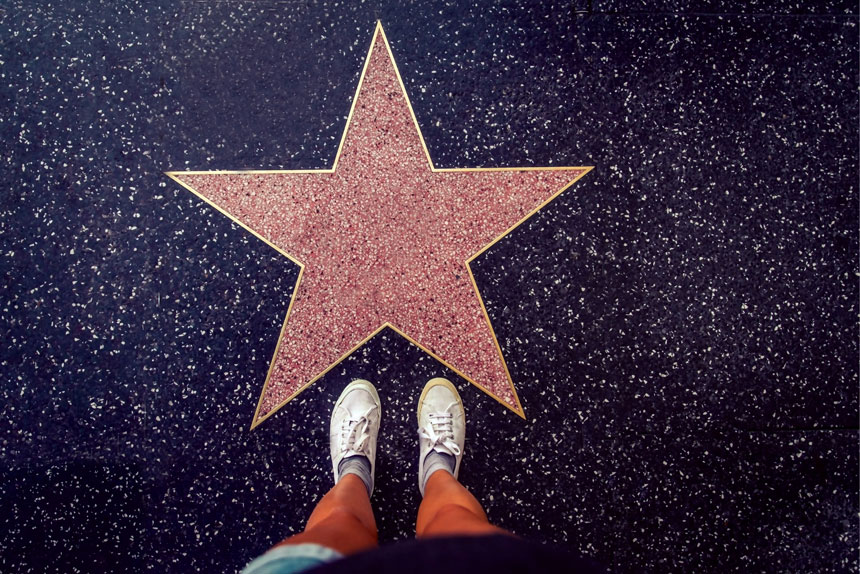Taylor Swift is a huge celebrity. Let’s agree on that. But what about Elon Musk? Stephen King? Are they true celebrities? Or are they just well known?
Hard to remember in this era of Oscars, Grammys, and self-aggrandizing awards shows of every kind, but there was a time when people of extraordinary talent, or who had made a notable contribution to the public welfare, were respected and admired — and that was plenty good enough. Maybe they’d get a street named after them. There was no such thing as a national “celebrity” as we think of one now. No statuette for Best 24-Hour Plumber of the Year.
If you’ve seen the hit musical Chicago, you may recall the song that takes a stab at defining celebrity: It’s “somebody that everyone knows / They’re gonna recognize my eyes / My hair, my teeth, my boobs, my nose.” Well, not too far off.
Today, what we refer to as serious “celebrity” is cooked up in a stew consisting of personal vanity, bejeweled popinjays, and hyper-caffeinated publicists, amplified times a billion by the internet, especially on social media. The process by which one is fabricated — sometimes pre-fabricated — into a bona fide celeb is not always ugly, but usually it ain’t pretty. Having talent helps, although it’s not essential. (Hello, any Kardashian.)
Obviously, our biggest celebrities are found in TV, film, and music. That’s the golden triangle. The sciences, business, and literature, not so much. (Which kicks Musk and King down to the minors.) Even pro athletes seek a higher profile by participating part-time in showbiz, where self-obsession — and, yeah, boobs — constitute the Number One fixation.
Across America, top stars are treated better than royals. Millions have been infected by our mostly middle-brow, albeit ubiquitous, celebrity culture. Daily, these lucky folks are gifted complimentary everything, which is both counterintuitive and an insult to us ordinary mortals. This is not a positive observation about what our country values, but it is accurate.
Granted, there are degrees to all this. If, as a pilot, you manage to successfully bring in a big plane beset by wonky landing gear, you might for a moment be famous. But if you’re Captain Chesley Sullenberger and you land a US Airways jet in the Hudson River, then go on to be an actor, author, subject of a movie, and frequent TV guest, I submit that you have officially crossed over into full-tilt celebritydom — and it’s totally warranted. Because that man saved lives, which is something no high-profile TikTok influencer has ever done.
Here, a confession. I shouldn’t be so flip about this topic. For more than 20 years as a correspondent, bureau chief, and editor of People and Entertainment Weekly magazines, I was complicit in lubricating the star-making machinery of the day. It is because of my proximity to the process that I understand it so well.
Someone who understands it even better is Landon Y. Jones, a former editor of People and the author of last year’s Celebrity Nation, a comprehensive examination of the phenomenon. When I asked Jones to tell me what he’s learned since the publication of his book, he wrote back that “celebrity is inescapable, even for people who want to avoid it. Too much money is riding on it. And the damage it is doing to public communities and cohesion is everywhere.” Uh, any good news to report?
Sorry, but nope; it gets worse. Said Jones: “I shudder to imagine what the 2024 elections will be like.” Strap in, everyone.
In the January/February issue, Cable wrote about our obsession with food-based TV competitions.
This article is featured in the March/April 2024 issue of The Saturday Evening Post. Subscribe to the magazine for more art, inspiring stories, fiction, humor, and features from our archives.
Become a Saturday Evening Post member and enjoy unlimited access. Subscribe now




Comments
That’s interesting Cable that you were a correspondent, bureau chief and editor of People and Entertainment Weekly. I’m not sure which 20 year period you were with People, which is turning 50 next month. Most people today don’t know People was created by the editors and staff of the weekly LIFE after it was shut down at the end of 1972 due to economic unsustainability.
Although the company was working on reviving LIFE later in the decade as a monthly, the standard-size People was kind of a ‘no frills LIFE’, concentrating on the people aspect, ranging from ordinary Americans, to authors, astronauts, musicians, and of course movie stars and celebrities that would be on the cover.
I have several issues of the People from 1974-’76 and they look beautiful enough to have been LIFE covers as indeed they were shot by LIFE’s famous photographers. Inside, the pictures and layouts were very much the same. People had a genuine, down-to-earth feel to it the first 20 years that was largely lost from the mid-90’s onward as American culture went the way of The Jerry Springer Show, and featuring the same people over and over again.
Today there is FAR to much media out there than is needed. A beast that constantly needs feeding. This has brought fame to people like the Kardashians who never would have been celebrities years ago. As Bobby Lime stated, having a middle brow popular culture would be a huge step upward. James Elliot made good points on not recognizing half people who were listed as celebrities in ’23, much less any real contributions by any of them.
Getting back to People, I have no idea who half the people are on their (and competitor’s) covers today. I’m not alone. I know a lot of people who’ve dropped subscriptions for that reason; finding a lot are on obscure cable-TV channels.
Many are undeserving rich, very in-your-face about all they have, and all we don’t by comparison which is very obnoxious. We’ve got most of the people in Washington, D.C. (both parties) intentionally making our lives hell as it is, without the D.C. west coast garbage (Hollywood) making it worse.
The whole thing IS unravelling, but not fast enough. The evening talk shows not only no longer have hosts on the levels of Carson, Leno and Letterman, the guests on Colbert, Fallon and Kimmel are nothings too, so they do go together.
These three keep harping non-stop on the former President thinking they’re getting back at him, and their joke’s are funny. Neither is true, and they’re only helping to propel the man they think they’re ‘taking down’, and will continue to do so. There’s a definition for doing the same thing over and over again and expecting a different result, called insanity. Let them (and plenty of others) hang themselves with their own nooses as the year goes on.
I was interested in Cabel Neuhaus’ thoughts about celebrities. There was another article recently naming “celebrities” in 2023. It occurred to me that i didn’t recognize half of those listed. Few of them, as far as i was aware, actually made significant contributions in arts, science or philanthropy. As we continue to adjusting to a world based on social media, perhaps this will re-balance?
I think it was the historian, Daniel Boorstin, former Librarian of Congress, who observed that in the Middle Ages, people venerated saints, while currently they venerate celebrities. I know that Boorstin wrote about the mysterious phenomenon of people whose fame seems to be rooted primarily in their being famous.
You wrote a fine article. I take issue with only one thing, your description of our popular culture as mostly middle brow. I think for current America, having a middle brow popular culture would be a huge step upward.